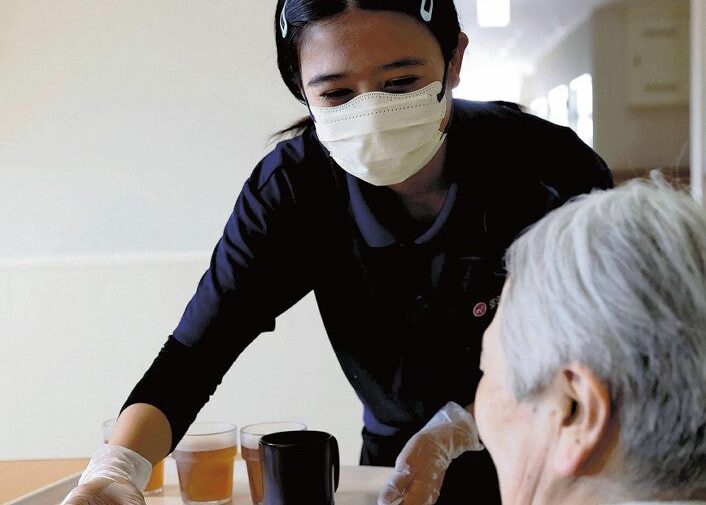Jobs
Revised Law Will Let Foreign Trainees Switch Jobs; Current System Leaves Some Locked Into Bad Situations

An Indonesian technical intern trainee helps a resident at the Shoyoen special nursing home for the elderly in Natori, Miyagi Prefecture, in May.
19:05 JST, June 15, 2024
The revised Immigration Control and Refugee Recognition Law, enacted Friday, will establish a system to replace what is now the foreign technical intern trainee system, allowing workers in the system to change jobs of their own will.
Although this revision raises expectations for a better labor environment and the retention of human resources in the nation, there are concerns about the rise of predatory job brokers and the outflow of workers from regional areas.
The envisaged training and employment system will replace the current technical intern training program by 2027.
Fleeing mistreatment
“There have been cases in which the pay and treatment are nothing like what we were told,” a woman who came to Japan from Vietnam as a technical intern last April told The Yomiuri Shimbun in an interview this April.
“It’s great that we can change our workplaces as we wish,” she added.
The 32-year-old woman experienced harsh working conditions at a plastic manufacturing factory in the Kanto region. She worked from 10 a.m. to 8 p.m. for 14 days a month, but her monthly take-home salary was sometimes as low as ¥22,000.
“My salary all went for food, and I had none left to do any other shopping,” she recalled.
In October, she could no longer bear the poor working conditions and ran away from the factory.
She subsequently found a job as a hotel cleaner via Facebook, but a Vietnamese man whom she contacted swindled her out of ¥70,000 for what he described as a referral fee among other charges.
In need of money, she took shelter at a support group, where she was helping with cleaning for a while, but earlier this month the woman left Japan for home in despair.
Under the current technical intern training program, trainees are in principle not allowed to change workplaces for three years. Under such circumstances, trainees can be forced to work for low wages and are subjected to harassment, leading to constant criticism that the current system is a hotbed of human rights violations as well as a factor behind the disappearances of trainees. As of the end of last year, there were 404,556 trainees in the nation. In 2022, 9,006 trainees went missing.
Become a country to be chosen
The new training and employment program will allow workers to change jobs in the same industry after a year or two of employment if they meet such requirements as having Japanese language skills.
The revision aims to protect the rights of foreign nationals as workers and create an environment that helps them to work in Japan for a long time.
“It is imperative for Japan to become a ‘country to be chosen,’” said Justice Minister Ryuji Koizumi during the Diet deliberations on the amendment of the law. “We want [foreign nationals] to stay in Japan as long as possible to improve their skills,” he said, expressing his hope that the new system will help foreign workers establish themselves in Japan.
However, the rise of nefarious brokers who exploit the job seekers for whom they act as intermediaries will likely continue to be a concern. As part of measures to tackle the situation, the government will allow only HelloWork public job placement offices to be involved in most job transfer procedures, not private business operators. The revised law also includes stricter penalties for assisting people in engaging in illegal work.
However, Jiho Yoshimizu, who heads the Japan-Vietnam Tomoiki Support Association, a Tokyo-based nonprofit organization that supports trainees, has pointed out that such measures will not be enough to eliminate brokers who scheme to approach trainees.
“If companies provide an adequate environment for accepting workers, it will help to prevent workers from going missing and wanting to change their jobs,” said Yoshimizu. “Companies need to improve their environment and raise awareness of human rights.”
Outflow to urban areas
In regional areas, some employers are concerned that foreign workers may leave for urban areas, where wages are higher.
At Shoyoen, a special nursing home for the elderly in Natori, Miyagi Prefecture, five technical intern trainees assist residents with meals and bathing.
“They are all very diligent and have good feedback from our residents,” said Hiroshi Matsukawa, 67, president of Miyagi Fukushikai, the social welfare corporation that operates the facility.
The facility has made efforts to create a comfortable working environment such as by providing a space for Muslim workers to pray and offering accommodation nearby for ¥5,000 per month. The foreign workers are an important asset to support the facility.
“We must think further about how we can encourage them to continue working,” said Matsukawa.
The revised law includes a supplementary provision stating that the government will take necessary measures to prevent an excessive concentration of foreign workers in urban areas.
“With Japan facing a serious labor shortage due to a declining and aging population, foreign workers are indispensable,” said Chieko Kamibayashi, professor emeritus of industrial sociology at Hosei University. “The revised law, which also aims to secure human resources, can be evaluated as a review done in line with the actual situation.”
“Local governments need to actively promote the attractiveness of regional areas, where housing and food costs are relatively low and also focus on support for foreign workers to settle in, such as by providing public housing,” she added.


)






